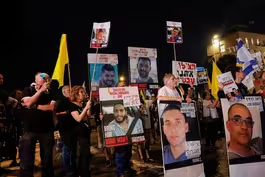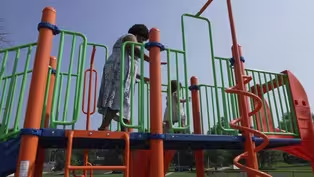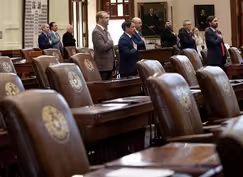
Bangladesh faces uncertainty a year after PM's resignation
Clip: 8/5/2025 | 8m 7sVideo has Closed Captions
Bangladesh faces political unrest and uncertainty a year after leader's resignation
One year ago, a popular uprising in Bangladesh led to the deposal of its long-serving prime minister. It came as the country faces multiple long-term challenges related to climate change, public health and now, political instability and the threat of tariffs. In partnership with the Pulitzer Center, Fred de Sam Lazaro reports.
Problems playing video? | Closed Captioning Feedback
Problems playing video? | Closed Captioning Feedback
Major corporate funding for the PBS News Hour is provided by BDO, BNSF, Consumer Cellular, American Cruise Lines, and Raymond James. Funding for the PBS NewsHour Weekend is provided by...

Bangladesh faces uncertainty a year after PM's resignation
Clip: 8/5/2025 | 8m 7sVideo has Closed Captions
One year ago, a popular uprising in Bangladesh led to the deposal of its long-serving prime minister. It came as the country faces multiple long-term challenges related to climate change, public health and now, political instability and the threat of tariffs. In partnership with the Pulitzer Center, Fred de Sam Lazaro reports.
Problems playing video? | Closed Captioning Feedback
How to Watch PBS News Hour
PBS News Hour is available to stream on pbs.org and the free PBS App, available on iPhone, Apple TV, Android TV, Android smartphones, Amazon Fire TV, Amazon Fire Tablet, Roku, Samsung Smart TV, and Vizio.
Providing Support for PBS.org
Learn Moreabout PBS online sponsorshipGEOFF BENNETT: One year ago today, a popular uprising in Bangladesh deposed its long-serving prime minister.
The country now faces multiple long-term challenges related to climate change, public health, and, more immediately, political instability and the threat of tariffs.
In partnership with the Pulitzer Center, our Fred de Sam Lazaro recently traveled to Bangladesh and has the first of three reports.
FRED DE SAM LAZARO: Across Bangladesh's capital, the posters and graffiti are a reminder of the unrest that escalated sharply and violently last July.
By the time Prime Minister Sheikh Hasina had fled into exile in neighboring India, at least 1,400 people had been killed and thousands injured, most of them students who led the protests.
MARIA RAHMAN, Student: It's we who accelerated the July revolution, not the political leaders, we the students, we the general people.
FRED DE SAM LAZARO: Twenty-two-year-old Maria Rahman was part of the marches.
She remains hopeful and patient.
MARIA RAHMAN: Change won't come overnight, but we have now the environment of democratic practice.
FRED DE SAM LAZARO: That's fueled the hopes of 25-year-old grad student Abidur Rahaman.
ABIDUR RAHAMAN, Student: I want to see an inclusive Bangladesh where every political party tolerates each other.
FRED DE SAM LAZARO: He says observant Muslims in this predominantly Islamic country were targeted by Hasina's regime.
It was accused of widespread human rights abuses, torture and forced disappearances against political opponents, journalists and perceived supporters of the faith-based Jamaat-e-Islami.
TAZIN SUMAYA, Student: I don't trust the police as much as I used to do.
FRED DE SAM LAZARO: Twenty-four-year-old grad student Tazin Sumaya says things in some respects have gotten worse in recent months.
TAZIN SUMAYA: As a woman, I'd say the security of people on the street has been really bad lately.
FRED DE SAM LAZARO: Frustration echoed away from the university campus as well.
We rode across Dhaka's Banani Lake to the informal slum settlement of Korail.
Mohammad Rubel is a boatman.
MOHAMMAD RUBEL, Boatman (through translator): What we had in the past a year ago and what we have now is the same.
We don't see any difference.
Life has not yet improved.
ALI RIAZ, Vice Chairman, National Consensus Commission: The expectation was too high.
FRED DE SAM LAZARO: Professor Ali Riaz, on leave from Illinois State University, heads a so-called Consensus Commission trying to coax some 30 political parties united only in their opposition to Hasina to agree on democratic reforms.
The goal was to topple Hasina, he says, with little thought for what then?
ALI RIAZ: It was spontaneous.
It was led by young people who have no previous experience, even no idea of governance.
FRED DE SAM LAZARO: Governance is especially challenging in this nation of 175 million people squeezed into a land mass the size of Iowa.
Born out of a bloody civil war of independence from Pakistan in 1971, the country has made progress reducing poverty.
Homegrown nongovernment groups have improved lives with microlending to start small rural enterprises and innovative public health programs.
There's been less luck with government.
NARRATOR: Now recognized as the leader of Bangladesh.
FRED DE SAM LAZARO: Founding leader Mujibur Rahman, Sheikh Hasina's father, was assassinated in 1975, ushering in decades of instability and autocracy under Hasina.
Following the uprising, military leaders invited Muhammad Yunus, whose work with microlending won him the Nobel Peace Prize, to lead an interim government.
REZA KIBRIA, Economist: There was probably no one else who could command the support of the people of Bangladesh.
FRED DE SAM LAZARO: However, economist Reza Kibria says Yunus has done little to change the systemic problems that have long plagued the country.
REZA KIBRIA: The level of corruption in the country is perhaps no less than in Hasina's time, which is saying a lot.
It's just a new set of people, and not saying that the head of the government is involved in any corruption directly, but he must bear some of the blame for the mismanagement.
FRED DE SAM LAZARO: Is he powerless to control it, unwilling?
REZA KIBRIA: Rather than powerless, he's not a person who is ready for the rough-and-tumble of running Bangladesh.
FRED DE SAM LAZARO: After initially agreeing to an interview, Yunus declined to participate in this report.
Ali Riaz agrees a political culture of kleptocracy has survived the Hasina regime, when billions were siphoned out of the country from government coffers.
ALI RIAZ: I have to grab things, I have to capture things, this mentality of the political party activists, especially at the grassroot level, this is my moment, this is my opportunity.
FRED DE SAM LAZARO: Meantime, the country's industrial mainstay, garment-making, it's second only to China in size, has its own challenges.
Many factory owners have fled the country for fear of retribution for their loyalty to the Hasina government.
It's left tens of thousands of workers unemployed and owed wages.
TANZIRA, Garment Worker (through translator): On February 9, they just closed the factory.
FRED DE SAM LAZARO: Under a monsoon downpour, I talked to Tanzira, a mother of two daughters who uses only one name.
She said she's owed two months' salary, plus severance pay.
TANZIRA (through translator): I have to pay school fees, rent, other essentials, and I have no money.
My daughters are in school and they tell me, don't send us to school.
The teachers insult us because the fees are overdue.
FRED DE SAM LAZARO: She and hundreds of others were camped outside the garment industry association's offices.
The group's president says it's limited in how much it can help.
But Mahmud Hasan Khan says there's an even bigger threat, how tariffs imposed by the U.S., the largest market for Bangladeshi garments, will ricochet here, especially if rising prices cause American consumers to cut back.
MAHMUD HASAN KHAN, President, Bangladesh Garment Manufacturers and Exporters Association: Buyers over there have buying capacity that is limited.
So if consumption goes down, then order placement will be less.
Then, if order placement less, then the factory -- some factory may shut down.
FRED DE SAM LAZARO: The tariffs are pegged to the balance of trade, and Bangladesh sells more to the U.S. than it buys from it.
It has offered to purchase more U.S. cotton, wheat and soybeans and is considering an order of Boeing commercial aircraft.
But Reza Kibria says the country has few other options.
REZA KIBRIA: We don't buy too much in the form of aerospace equipment or U.S. cars.
FRED DE SAM LAZARO: You just can't afford it.
REZA KIBRIA: We never have been able to afford it and it's not going to happen in the near future.
So the poor in this country will suffer from these tariffs.
FRED DE SAM LAZARO: Muhammad Yunus wants a new government to take on the tasks ahead and today announced that elections will be held next February.
It won't be easy.
Sheikh Hasina, whose party is banned from participating, remains active on social media from India, which has not moved on a request to extradite her to stand trial.
REZA KIBRIA: Until she is brought to justice, it's very difficult for Bangladesh to return to a normal, stable path.
FRED DE SAM LAZARO: The country's election commission said it will soon release a specific timeline for the campaign to begin.
For the "PBS News Hour," I'm Fred de Sam Lazaro in Dhaka, Bangladesh.
GEOFF BENNETT: Fred's reporting is a partnership with the Under-Told Stories Project at the University of St. Thomas in Minnesota.
Can Trump deliver on his energy export promises?
Video has Closed Captions
Clip: 8/5/2025 | 6m 25s | Can Trump deliver on his energy export promises? Expert weighs in (6m 25s)
How Trump's embrace of QAnon kept Epstein in the spotlight
Video has Closed Captions
Clip: 8/5/2025 | 7m 1s | How Trump's embrace of conspiracy theories kept the Epstein case in the spotlight (7m 1s)
Israeli hostage in Hamas video is a broken man, cousin says
Video has Closed Captions
Clip: 8/5/2025 | 7m 5s | Israeli hostage shown in Hamas video is starved, tortured and 'a broken man,' cousin says (7m 5s)
Mothers open up about worrying decline in mental health
Video has Closed Captions
Clip: 8/5/2025 | 7m 50s | Overwhelmed and stressed: Mothers open up about worrying decline in mental health (7m 50s)
New book documents motivation and development of atomic bomb
Video has Closed Captions
Clip: 8/5/2025 | 9m 7s | 'The Devil Reached Toward the Sky' documents motivation and development of the atomic bomb (9m 7s)
News Wrap: Texas AG attempts to expel Dems who left state
Video has Closed Captions
Clip: 8/5/2025 | 6m 31s | News Wrap: Texas AG attempts to expel Democrats who left state to block redistricting vote (6m 31s)
Providing Support for PBS.org
Learn Moreabout PBS online sponsorshipSupport for PBS provided by:
Major corporate funding for the PBS News Hour is provided by BDO, BNSF, Consumer Cellular, American Cruise Lines, and Raymond James. Funding for the PBS NewsHour Weekend is provided by...

















